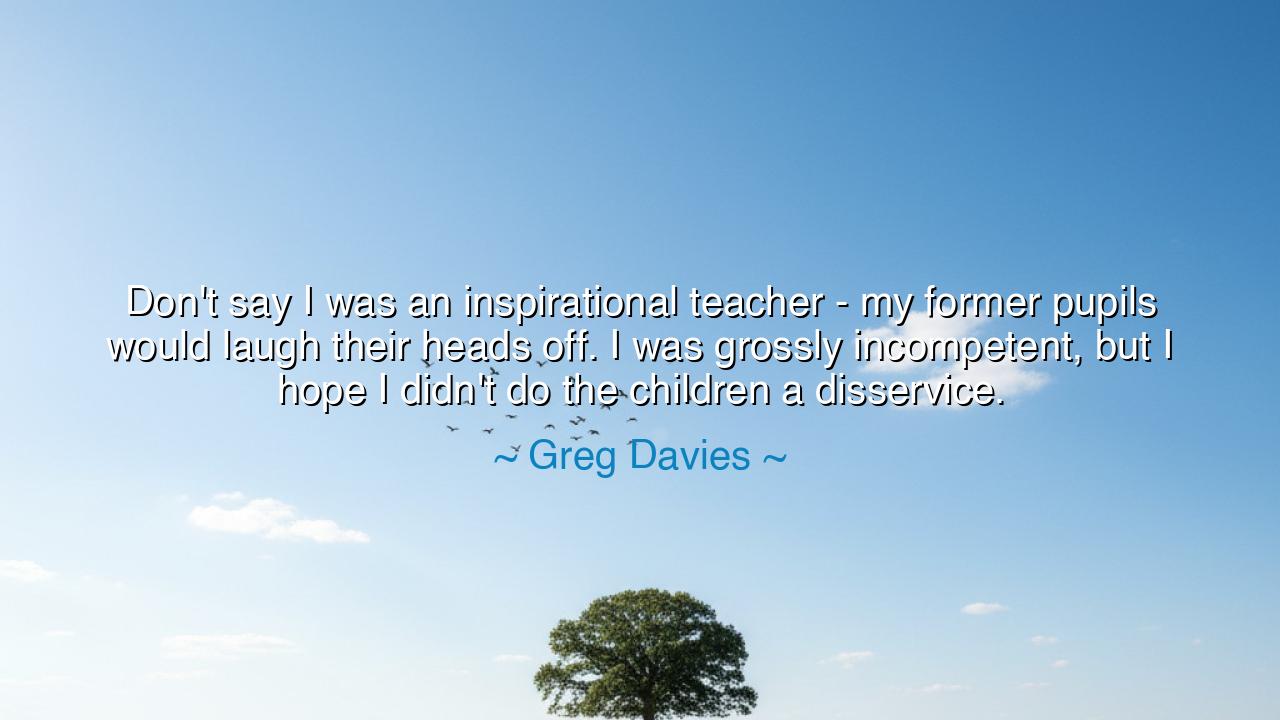
Don't say I was an inspirational teacher - my former pupils would
Don't say I was an inspirational teacher - my former pupils would laugh their heads off. I was grossly incompetent, but I hope I didn't do the children a disservice.






In the self-effacing words of Greg Davies, there shines a quiet and noble truth: “Don’t say I was an inspirational teacher – my former pupils would laugh their heads off. I was grossly incompetent, but I hope I didn’t do the children a disservice.” Beneath the veil of humor, there is humility; beneath the laughter, a lesson in humanity. For what he confesses here is not failure, but the wisdom that comes from embracing imperfection. In this quote, Davies, once a teacher before his fame as a comedian, reminds us that greatness lies not in perfection, but in sincerity, and that even flawed hands can shape meaningful lives.
In the ancient world, humility was not weakness but strength. The philosophers of Greece and the sages of the East understood that to know one’s limits was the beginning of wisdom. Socrates, who claimed to know nothing, became one of the greatest teachers precisely because of that admission. He did not raise himself above his pupils; he walked beside them, questioning, learning, laughing. In much the same way, Greg Davies’ humor is the laughter of truth — the acknowledgment that even those who guide others are still learners themselves. His jest, “my former pupils would laugh their heads off,” is not self-mockery, but an offering of authenticity. For students, like all people, learn best from those who dare to be real.
His confession of being “grossly incompetent” holds more wisdom than a hundred boastful claims of mastery. To admit one’s flaws openly is to release the burden of false pride. In every age, the wisest mentors have known that influence is born not from authority, but from honesty and heart. The teacher who stumbles, yet cares deeply, teaches more through his humanity than through his lectures. The great Roman statesman Cicero once wrote that “to err is human, but to learn from one’s errors is divine.” Davies embodies this truth — for though he laughs at his own shortcomings, his very humility transforms them into a lesson on grace.
When he says, “I hope I didn’t do the children a disservice,” there is tenderness — the eternal conscience of the teacher who wonders whether he has done enough. It is the same ache that has haunted every guide, every parent, every leader since time began: the hope that one’s effort, though imperfect, has not been in vain. In the halls of ancient Alexandria, scholars labored over scrolls they would never finish, yet their intent alone kept the light of learning alive. So too does Davies’ simple wish — not to have harmed, not to have misled — echo this sacred calling. For in the heart of teaching lies not the hunger for praise, but the prayer to have done good.
Consider Diogenes, the philosopher who lived in a barrel and mocked the pretensions of Athens. Though called mad, his lessons on virtue shaped generations. He was no polished orator, no polished teacher — yet his truth burned bright. Greg Davies, through his self-deprecating humor, stands in that same lineage of teachers who instruct by imperfection. His comedy, like Diogenes’ cynicism, exposes the false glamour of authority and celebrates the messy, human beauty of learning. By laughing at himself, he reminds us that wisdom wears no crown — it wears a smile.
And so, in this seemingly lighthearted quote, there beats a powerful message: that to inspire others does not mean to appear flawless, but to be genuine; not to stand above, but to walk beside. The teacher who can laugh at his mistakes teaches his students that failure is not the end, but a passage toward understanding. True teaching — whether in classrooms or in life — is not about creating admiration, but awakening curiosity, compassion, and courage.
From Greg Davies’ humility, we may draw a lesson for ourselves: do not fear your imperfections; let them teach you, and through them, teach others. Speak with honesty. Laugh at your errors. Care deeply for those entrusted to your influence. For the measure of a good life is not the absence of mistakes, but the presence of kindness and truth.
Thus, let this wisdom endure: that even those who feel “grossly incompetent” may yet be inspirational, not through mastery, but through heart. When we admit our flaws, we make space for others to grow. When we laugh at our limits, we show that love is stronger than pride. And when we, like Greg Davies, can say humbly, “I hope I did no disservice,” then we have, in truth, already done our greatest service to the world.






AAdministratorAdministrator
Welcome, honored guests. Please leave a comment, we will respond soon